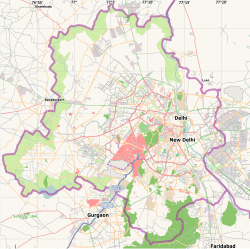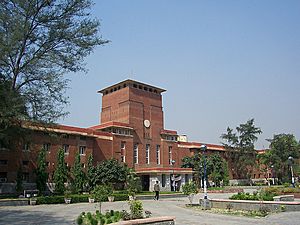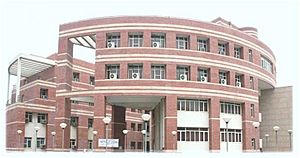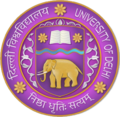Delhi University facts for kids
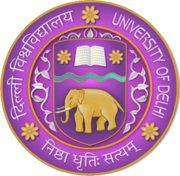
Seal
|
|
| Motto | Nishtha Dhriti Satyam (Sanskrit) |
|---|---|
|
Motto in English
|
Dedication, Steadfastness and Truth |
| Type | Public Central University,Institute of Eminence |
| Established | 1 May 1922 |
| Accreditation | NAAC |
|
Academic affiliations
|
|
| Endowment | ₹433 crore (US$74 million) |
| Chancellor | Vice President of India |
| Vice-Chancellor | Yogesh Singh |
| Visitor | President of India |
|
Academic staff
|
1,060 |
| Students | 1,892,000+ |
| Undergraduates | 120,000+ |
| Postgraduates | 20,344 |
| 3,700 | |
| Location |
,
India
28°41′N 77°13′E / 28.69°N 77.21°E |
| Campus | Urban |
| Colours | Purple |
| Mascot | Elephant (Strength and wisdom) |
The University of Delhi, often called DU, is a big university in Delhi, India. It started in 1922 and is known as an 'Institute of Eminence' by the government. DU has many different departments and colleges across Delhi. It is one of the largest university systems in the world, with over 400,000 students. The Vice President of India is the university's chancellor. In 2023, it was ranked 11th among universities in India.
Contents
History of Delhi University
The University of Delhi was created in 1922 by a special law. Hari Singh Gour was the first head of the university, called the Vice-Chancellor, from 1922 to 1926.
When DU first started, there were only four colleges in Delhi:
- St. Stephen's College, Delhi (started in 1881)
- Hindu College, Delhi (started in 1899)
- Zakir Husain Delhi College (started in 1792)
- Ramjas College (started in 1917)
All these colleges later became part of the university. At first, DU only had two main study areas, Arts and Science, with about 750 students.
In 1911, the capital of British India moved from Calcutta to Delhi. The big house where the Viceroy (the ruler) lived was given to the University of Delhi in 1933. Since then, it has been the main office for the university's head.
When Sir Maurice Gwyer became the Vice-Chancellor in 1937, he helped the university grow a lot. He started new courses for advanced students and built laboratories. Important teachers like Daulat Singh Kothari (Physics) and Panchanan Maheshwari (Botany) worked there. Sir Maurice Gwyer is often called the "maker of the university" because of his work until 1950.
In 1947, India became independent, which was also the university's 25th anniversary. The Indian flag was raised at the main building for the first time. A special ceremony was held in 1948, attended by important leaders like Jawaharlal Nehru, India's first Prime Minister. In 1973, for the 50th anniversary, Prime Minister Indira Gandhi and famous artists like Satyajit Ray and M. S. Subbulakshmi were present.
Delhi University Today
The University of Delhi has become one of the biggest universities in India. It has 16 main study areas (faculties) and 86 academic departments. There are 91 colleges spread across the city. Over 132,000 students study full-time, and many more are in distance learning programs.
Some of DU's departments, like Chemistry, Geology, Zoology, Sociology, and History, are recognized as "Centres of Advanced Studies" because of their excellent work.
Since 2022, students get into DU based on their scores in the CUET (Central Universities Common Entrance Test) exam, not just their 12th-grade marks. If students have the same CUET score, their 12th-grade marks are used to decide who gets in.
DU is a very popular place for higher education in India. It also produces a lot of research papers compared to other Indian universities.
Many famous people have received special honorary degrees from the university. These include actor Amitabh Bachchan, former Chief Minister of Delhi Sheila Dikshit, and former Prime Minister of the United Kingdom Gordon Brown.
University Campuses
There are 91 colleges connected to the University of Delhi, located all over Delhi. The two main areas are the North Campus and the South Campus. Zakir Husain Delhi College in central New Delhi is the oldest college, with a history of 300 years.
North Campus
The North Campus is home to the first three colleges of the university. It also has the School of Open Learning, the Faculty of Arts, the Faculty of Law, and many other colleges. Some well-known colleges here are Kirori Mal College, Hindu College, and St. Stephen's College. This campus also has important centers for advanced studies, like the Delhi School of Economics.
South Campus
The South Campus was opened in 1973 to help the university grow. It moved to its current location in 1984 and covers 69 acres. Colleges here include Gargi College, Jesus and Mary College, and Lady Shri Ram College.
Hostel Facilities
Some colleges at Delhi University offer hostels for students to live in. However, these facilities are limited, and students are usually chosen based on their academic performance. Only about 20 colleges have hostel options.
How the University is Run
Leadership
The President of India is the main patron of the university, and the Vice President of India is the Chancellor. The university has several important groups that help run it, like the Court, the Executive Council, and the Academic Council. These groups make decisions about how the university works, its rules, and its studies.
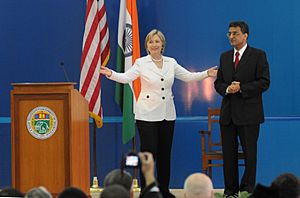
The University Court is the highest authority and can review decisions made by other groups. The Executive Council handles the day-to-day running of the university. The Academic Council makes sure that teaching, education, and exams meet high standards. The Finance Committee manages the university's money.
Colleges of DU
The colleges of Delhi University get their funding in different ways:
- Colleges started by educational or charity groups.
- Colleges managed by the Delhi Administration.
- Colleges managed directly by the University of Delhi.
Colleges managed by the university get full funding, while others get most of their funding from the university.
DU has 65 colleges that offer general courses in subjects like humanities, social sciences, and science. Many of these are linked to the South Campus, and others to the North Campus. Including colleges with professional courses, the university has 77 colleges. Some colleges also offer evening classes.
Faculties (Study Areas)
The University of Delhi has 86 academic departments, which are grouped into 16 main study areas, called faculties. Some of these include:
- Faculty of Arts
- Faculty of Commerce and Business Studies
- Faculty of Education
- Faculty of Law
- Faculty of Science
- Faculty of Social Sciences
- Faculty of Open Learning (for distance education)
In the past, the Faculty of Technology offered engineering courses. However, the engineering colleges that were part of DU later became separate universities.
Specialized Faculties
DU also has two specialized faculties:
- Faculty of Ayurvedic & Unani Medicine: This faculty teaches traditional Indian medicine.
- Faculty of Homoeopathic Medicine: This faculty teaches homeopathic medicine.
Special Centres and Institutes
DU has about 28 special centres and institutes. These include:
- Delhi School of Economics: A famous centre for advanced studies in economics, commerce, sociology, and geography.
- Delhi School of Journalism: Offers a five-year course in journalism.
- School of Open Learning: Provides courses for students who want to study from a distance.
- Cluster Innovation Centre: Focuses on new ideas and projects that connect research with real-world problems.
- Agricultural Economics Research Centre: Studies farming and the rural economy in India.
- Women's Study Development Centre: Focuses on topics related to women and gender.
Academics and Courses
DU offers many different courses, with 240 options for undergraduate (first degree) and postgraduate (advanced degree) students.
Students can choose from courses like MBBS (medicine) and BTech (engineering). The main study areas are arts, commerce, and science.
The university offers 70 postgraduate degrees and about 28 MPhil degrees. It also has many certificate and diploma courses, including advanced diplomas in various languages. Students can also pursue PhD degrees.
University Rankings
The University of Delhi is well-regarded globally and in India.
- Internationally, it was ranked among the top 521–530 universities in the world by QS World University Rankings in 2023.
- In Asia, it was ranked 85th by QS in 2023.
- In India, it was ranked 23rd overall by the National Institutional Ranking Framework (NIRF) in 2022, and 13th among universities.
Sports at DU
Delhi University Stadium is a large sports area located on the North Campus. It covers about 10,000 square meters and has seating for 2,500 people, with space for more temporary seats. It was built for the 2010 Commonwealth Games and opened in 2010.
The stadium is used for sports like rugby sevens. It also has training areas for netball, boxing, women's wrestling, and athletics. After the Commonwealth Games, the university took over the stadium and upgraded it to be a multi-purpose sports facility for students.
Student Life
Students Union
The Delhi University Students Union, or DUSU, is a group of students elected by their peers to represent them.
Festivals and Celebrations
Every college, department, and centre at DU has its own cultural, technology, and other festivals. These events are organized by student clubs and societies.
Societies and Clubs
Students at DU can join many different clubs and societies in their colleges, departments, and centres. These groups are run by the students themselves.
Famous People from Delhi University
Notable Alumni (Former Students)
Many famous people have studied at Delhi University.
- In politics, these include former Finance Minister Arun Jaitley, diplomat and writer Shashi Tharoor, and former President of India Fakhruddin Ali Ahmed.
- DU has also educated leaders from other countries, such as Aung San Suu Kyi from Myanmar and former Prime Ministers of Nepal and Bhutan.
- The university has produced many well-known actors and actresses in Indian cinema, including Amitabh Bachchan, Shah Rukh Khan, and Anurag Kashyap.
- Famous writers and poets like Vikram Seth and Khushwant Singh also studied here.
- In science, notable alumni include physicist Archana Bhattacharyya and engineer Vinod Dham, known as the "father of the pentium processor".
Notable Academics (Teachers)
Some very important teachers have worked at DU, including:
- Historians like R. S. Sharma and Ramachandra Guha.
- Nobel Memorial Prize in Economic Sciences winner Amartya Sen.
- Former Prime Minister of India Manmohan Singh.
Career Support
DU has a central placement cell to help all students find jobs and internships. Most colleges and departments also have their own career support teams that organize job and internship opportunities for students.
Startup Culture
Many colleges and departments at DU have groups that encourage entrepreneurship and help students start their own businesses.
Delhi University alumni have founded successful startups. Some examples include Zomato, a leading food delivery company, and MakeMyTrip, a popular online travel portal. These companies have had a big impact on the Indian and global markets.
To further support new ideas, the Delhi University-Cluster Innovation Centre (DU-CIC) was created in 2011. This special centre helps promote new ideas, entrepreneurship, and the startup culture among students.
Images for kids
See also
 In Spanish: Universidad de Delhi para niños
In Spanish: Universidad de Delhi para niños
- Delhi University Community Radio
- Jawaharlal Nehru University
- Jamia Millia Islamia
- List of colleges affiliated to the Delhi University
- List of institutions of higher education in Delhi
- University of Oxford v. Rameshwari Photocopy Service
 | Janet Taylor Pickett |
 | Synthia Saint James |
 | Howardena Pindell |
 | Faith Ringgold |


